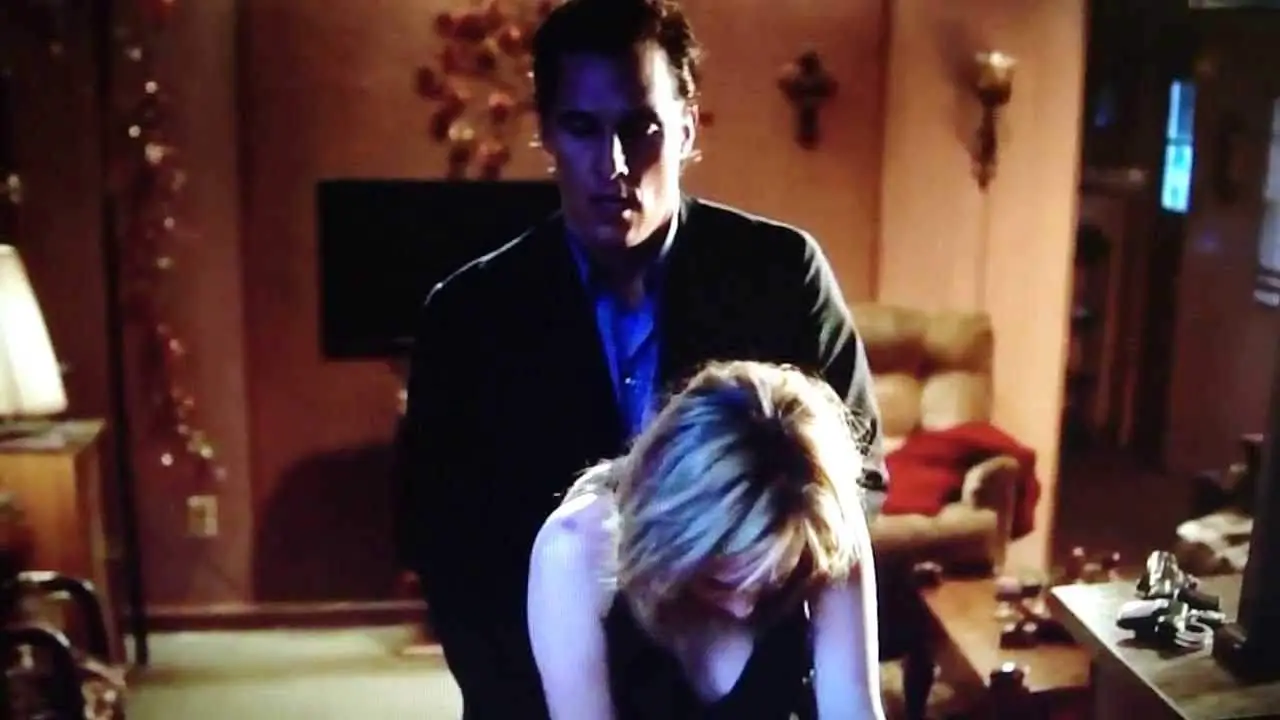Not Quite Horror is back from the dead. After resting for a bit in its kind-of creepy but still-normal-enough-to-pass-as-regular crypt, our biweekly series returns. In each installment, Joey Keogh will argue why a chosen film not generally classified as horror actually exhibits many of the qualities of a great flight flick, and therefore deserves the attention of fans as an example of Not Quite Horror. This week, it’s Karyn Kusama’s masterful study of a desperate woman, Destroyer.
Destroyer opens with a sun-bleached shot of Nicole Kidman’s face, blinking into the new day. We blink along with her, not just because it’s a difficult brightness to adjust to but because this isn’t the Kidman we’ve come to know and love. The glamorous Aussie actress who fought off an abusive husband in Big Little Lies and danced to her death in Moulin Rouge is unrecognisable under layers of impenetrable, deliberately unflattering makeup.
The character of Erin Bell, a deeply flawed L.A. beat cop with a barely disguised drinking probelm, is an entirely new side of Kidman the performer. Aside from the physical transformation, this is arguably the least likeable character she’s ever played. Bell, as portrayed by Kidman, is a character only a woman could have come up with. That woman just so happens to be horror heroine Karyn Kusama.
Related: Not Quite Horror: Widows
The genius behind The Invitation, Girlfight, and Jennifer’s Body demonstrably knows a thing or two about complicated, often tragic females. She puts Kidman front and centre in Destroyer and rarely lets the camera stray from her pained, ruined face. This is a character that’s been played by men ever since the invention of movies, so it’s extra invigorating to watch a woman tussle with such dark material — never mind a star with as much wattage as Kidman.

As Kusama’s slow-burn, deliberately confusing story plays out, she takes us into the darker corners of Los Angeles, the kinds of places Bell feels at home because she’s no longer comfortable anywhere else. Whether or not this woman even has a home is left in doubt, waking up as she does frequently in her car. The sun continues to shine as it always does in California, but Bell remains untouched by it.
The light may hit her liver spotted visage, but she feels no warmth. Adding to the effect is Kidman’s sloped, stunted posture. Her Bell walks as though tired of dragging this decrepit body around any longer, like she can’t even summon the strength to put one foot in front of the other. It’s an incredibly physical performance, sold from that first image of her face to the last one, a similarly too-bright shot of Bell reclining in her car once more.
For a crime movie, Destroyer‘s horrors are, surprisingly, mostly implied. A game of Russian roulette here, a half-hearted hand-job to a dying man there. But the sense of creeping dread, the feeling that only bad things happen in this universe, creeps under your skin, making a home in your bones until it chills you to the core. Bell’s choice of a heavy leather jacket almost makes sense in a weird way. It’s like a barrier to the outside world.
Kusama establishes Bell as the antihero of the piece, but it’s Toby Kebbell’s long-haired gang-leader who’s the real villain. He doesn’t do anything particularly violent until the film’s final act, but he sits, watching everything, like a predator stalking his prey. As soon as he sets his sights on Sebastian Stan’s kindly Chris, it’s obvious the poor guy doesn’t stand a chance, regardless of how convincing his undercover character is.

Destroyer flits back between the present day, where Bell is an alcoholic mess barely holding down a job, and 17 years previous, when she and Chris infiltrated Kebbell’s group of low-level bank robbers. It’s a smart choice because it fills in the gaps without the need for Bell to stand around spouting exposition. Her strained relationship with her teenage daughter, for example, is never fully excavated. We intimate what went wrong by what’s not said.
As a female director, Kusama isn’t afraid to let Bell get beaten bloody, but she ensures none of the violence perpetuated against her protagonist is exploitative. The effects are keenly felt, but the cop is already so beaten down by the hand she’s been dealt in life, and her self-destructive nature, that she struggles on. In one key sequence, she fights back in a big way against Bradley Whitford’s obnoxious rich guy. In this instance, the camera lingers, giving us a good look at the damage Bell is causing.
See Also: Not Quite Horror: The Beguiled
Still, she saves the worst beatings for herself and her poor liver, which must surely be working overtime by the time the film catches up with Bell the morning after yet another binge. Kusama and female cinematographer Julie Kirkwood (who also shot Oz Perkins’ stunning The Blackcoat’s Daughter/February) have a light touch, but their L.A. is a fully-fledged nightmare rather than the dream-scape Hollywood often presents as in movies.
Destroyer is a real-life horror movie, the kind that doesn’t require anything even resembling an otherworldly threat to sell us on how dark and disturbing its premise is. Kidman carries the whole thing on her back, much like her young daughter in a devastating flashback to the two getting stranded in the snow-covered woods together. Erin Bell is remarkable not least because she’s a female character, but because she’s a believable human struggling to make it through the day. Her horrors are ours.






